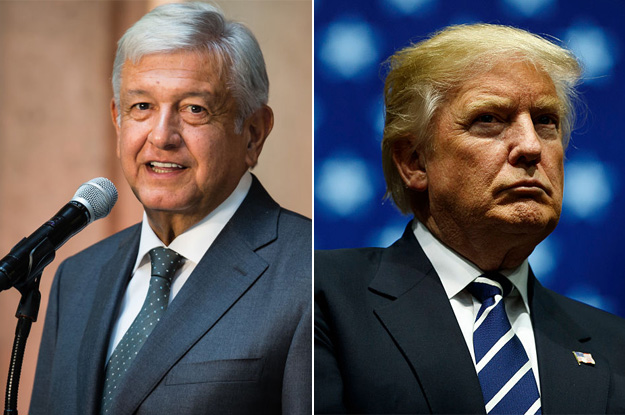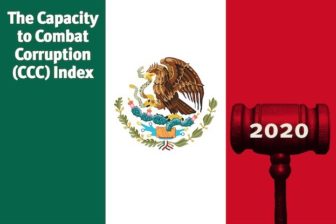MEXICO CITY – Andrés Manuel López Obrador’s visit to Washington this week, to celebrate the new North American trade agreement (USMCA, or TMEC in Spanish), has kicked up controversy on both sides of the border. In Mexico, opposition leaders have demanded he cancel the trip, citing Donald Trump’s attitude toward migrants, the coronavirus and other issues. In the U.S., the Democrat-led Hispanic Caucus has accused Trump of trying to distract from his disastrous handling of the COVID-19 pandemic with a presidential visit.
But while López Obrador’s trip carries significant political risk, his first face-to-face run-in with Trump was in many ways inevitable. Far from a drastic break with previous norms in the bilateral relationship, as some critics claim, the trip represents an unavoidable step for Mexico’s president, regardless of who is in the White House.
After two years in office, AMLO, as López Obrador is widely known, has stumbled into the most trying period of his presidency. COVID-19 has hit Mexico hard, with thousands of new cases reported daily, one of the world’s highest fatality rates due in part to the prevalence of diabetes, obesity and hypertension, and a public health system under strain. Mexico’s economy is expected to shrink between 6% and 10% this year, and while AMLO’s approval ratings remain high (56%-68% according to recent polls in El Financiero and El Pais), they are trending in the wrong direction.
Given that context, AMLO’s trip has offered opposition leaders a golden opportunity to criticize the president, especially with mid-term elections approaching next year. The idea that López Obrador has bent under pressure from a racist, anti-Mexican, anti-migrant U.S. president is a powerful electoral message.
And Trump has indeed used Mexico as a punching bag at several points in López Obrador’s presidency, in particular by pushing the country and its neighbors in Central America to enforce stricter migration policies and detain migrants on their way north. Trump has erected his border wall virtually from Costa Rica to Mexico, at significant political cost to López Obrador.
But claims that AMLO’s visit will have a significant effect on voter opinion on either side of the border are overblown.
AMLO’s critics see in the Washington visit a repeat of former President Enrique Peña Nieto’s decision to invite Trump to Mexico City during the 2016 U.S. election campaign. With Trump’s candidacy reeling, and Peña Nieto deeply unpopular, the visit made Trump look presidential and gave some observers the impression it would help the Republican candidate with Hispanic voters.
There is little if any evidence to support that claim. Mexican presidents do not appear to have any superpower to direct votes in the U.S. to one presidential candidate or another. AMLO’s charisma is not contagious and there is little reason to believe it will affect the Latino vote, which has historically been more pro-Democrat but (it shouldn’t need to be said) is also diverse and has its own local interests.
It is also worth mentioning that the last time a Democrat was in the Oval Office, he was not particularly popular in Mexico. In fact, Barack Obama is known by some as the deporter-in-chief. Historic skepticism of the U.S. among the general population is not tied to one president or another. It is deeply rooted and long-lasting. For most Mexicans it makes no immediate difference what party governs north of the border.
Nor does the fact that Trump is in office change the importance of the broader bilateral relationship. Mexico and the U.S. are indispensable to one another. Our commercial partnership has created millions of jobs in North America, while Mexico has displaced China as the U.S.’ top trade partner. Beyond that, there are almost 40 million Hispanics of Mexican origin living in the U.S., while at least 1 million Americans live in Mexico. This relationship has always been and will probably always be asymmetrical, but Latino leaders in the Democratic Party (and opposition figures in Mexico) should understand that Mexico’s president has to meet with his most important ally, and that is the man who works at the White House, regardless of his political party.
There is also significance in the fact that López Obrador has chosen the USMCA in particular as the reason to leave the country for the first time since becoming president.
When AMLO was elected in July 2018, many feared that he would block NAFTA renegotiation or try to retreat from the 1990s free trade agreement altogether. But during a long five-month transition period before assuming office, AMLO instead collaborated with Peña Nieto’s administration and formed a negotiating team, led by Jesús Seade, to send the signal that a successful renegotiation would be a priority for his government. This was well received by opposition leaders in Mexico and by markets in both countries.
If Trump loses the election in November (and most of Mexico is likely hoping he will), it won’t instantly solve every aspect of the bilateral relationship. Both Republicans and Democrats need to take Mexico and the region as a whole more seriously. Integration between the two economies and societies is unstoppable and, if nothing else, Mexico should be a regular stop for U.S. presidential candidates, just as the U.S. is a stop for any Mexican presidential candidate. For now, though, Democratic and Republican Latino congressmembers have nothing to worry about. Trump will not get an extra vote for meeting AMLO. The visit could even offer a chance for progress on issues outside of trade, hopefully on the border and security. So yes, Trump and AMLO should meet – and also wear face masks, even if they both still refuse to do so in public.









